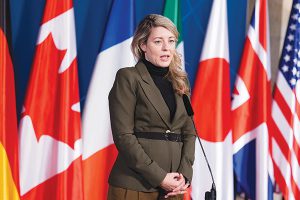Bloomberg
Prime Minister Justin Trudeau’s government is boosting military spending and expanding Canadian trade ties in the Indo-Pacific region as part of a “generational†policy shift aimed at countering China’s influence.
Foreign Minister Melanie Joly released her nation’s Indo-Pacific Strategy, including nearly $1.7 billion (C$2.3 billion) in spending. That money is being used for more navy patrols in the region, better intelligence and cybersecurity measures, and increased cooperation with regional partners in the East and South China Seas.
The 26-page document — unveiled by Joly and a trio of other ministers in Vancouver, with Trudeau’s defense chief holding a virtual briefing — includes a lengthy section on China, which it refers to as an “increasingly disruptive global power.â€
It cites multiple military, security and economic threats posed by the country, while acknowledging the need to work with it on issues
such as climate change, global health, biodiversity and nuclear non-proliferation.
Joly, in an hour-long interview with Bloomberg News ahead of the strategy statement’s release, said the world’s geopolitical “tectonic plates†are shifting. That’s threatening international norms that have kept the world safe since World War Two, as well as creating supply chain uncertainty and inflation.
“When it comes to China, we know that there’s a battle of influence happening in the region,†she said in Montreal. “So we have to step up our game.â€
Canada will also toughen its rules around foreign investment and take other steps to defend itself from
“foreign interference,†the document states. Its publication comes less than two weeks after Chinese President Xi Jinping confronted Trudeau on the sidelines of the Group of 20 summit in Indonesia, admonishing the Canadian leader for providing the media with information about an earlier discussion.
Joly told Bloomberg the encounter didn’t surprise her, as she’s also
had “frank conversations†with her Chinese counterpart in the course of diplomacy.
“You saw what we see happening normally,†she said. “You just had a glimpse of the political reality.†She also said crafting an Indo-Pacific strategy would have been fruitless without addressing China’s growing influence, “the elephant in the room.â€
Canada will increase its diplomatic and trade presence to create a more predictable environment for business investment in Asia, Joly said. It will invest C$750 million in sustainable infrastructure projects, which it hopes will attract further capital from Canadian pension funds.
At the same time, increased military cooperation with regional partners will protect the country’s Pacific interests, just as alliances with Europe through the North Atlantic Treaty Organization, and the US through the North American Aerospace Defense Command, have historically protected its Arctic and Atlantic interests, she said. Canada will invest almost half a billion Canadian dollars over five years on enhanced defense in the region.
“For a long time we’ve defined ourselves through the relationship we have with Europe,†Joly said. “It is time to look towards the Pacific.â€
The strategy contains a section devoted to deepening economic ties with India, and another devoted to Japan and South Korea — a neighbourhood it dubs the North Pacific.
 The Gulf Time Newspaper One of the finest business newspapers in the UAE brought to you by our professional writers and editors.
The Gulf Time Newspaper One of the finest business newspapers in the UAE brought to you by our professional writers and editors.
